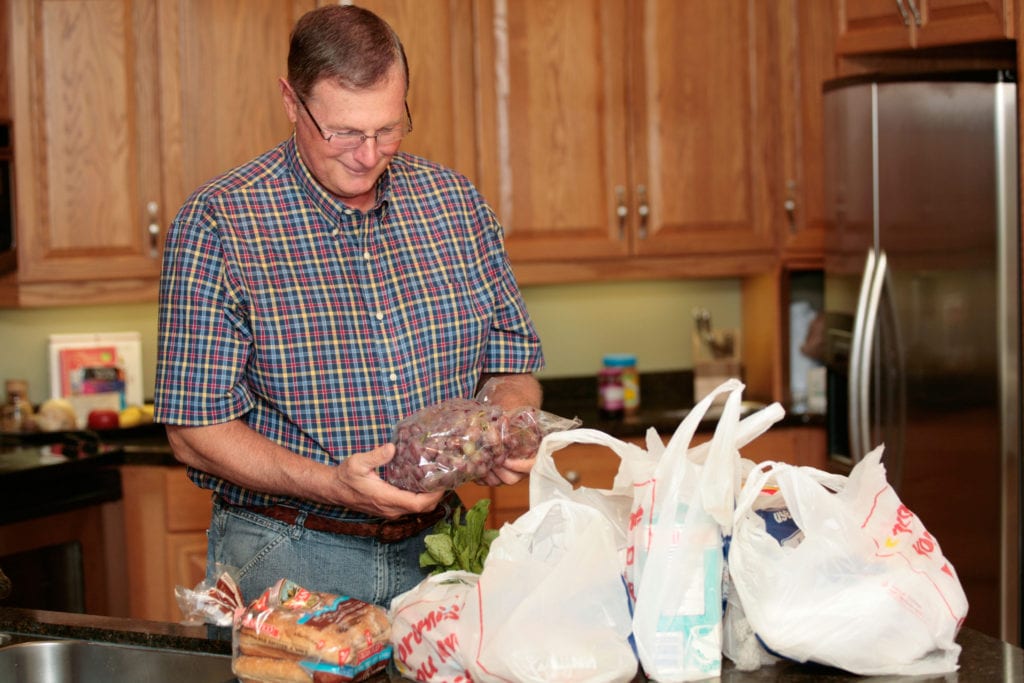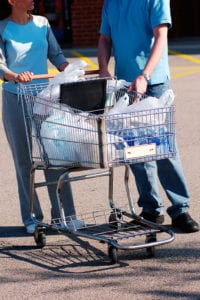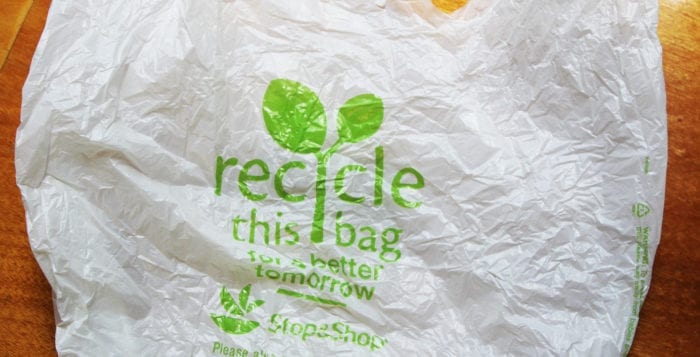
Suffolk County shoppers, get your nickels ready.
In an effort to encourage residents to shop with reusable bags instead of plastic and paper “carryout” bags that harm the environment, the Suffolk County Legislature is rolling out a 5 cent fee on all disposable bags at a variety of retail establishments, from supermarkets to department stores beginning Jan. 1.
The new law, which was officially passed by the Legislature in September 2016, applies only to the single-use plastic or paper bags provided by cashiers at the end of a sale and used to carry goods from the store. There won’t be a fee, however, on bags found in produce sections for fruits and vegetables, frozen foods or on bags by pharmacies to carry prescription drugs, according to the law.
Cashiers are required to add the total fees to a customer’s receipt based on how many bags are used. Residents can avoid the fee by either buying a reusable bag — ones made of cloth or canvas, which are available in many retail stores — or shopping with a bag from home.
“Hopefully people will say ‘I’m not paying 5 cents’ and go with the other options,” said Legislator William “Doc” Spencer (D-Centerport), who wrote the legislation to reduce the influx of plastic bag waste that gets trapped in trees, blocks storm drains and causes significant damage to water supplies and wildlife. “We’re hoping to change behaviors. While we won’t change everyone’s, this will change a lot of people’s and that can make a big difference. I think once people start to not use the plastic bags, they’re not going to really miss them.”
Spencer’s bill began in March 2016 as a ban on all single-use plastic bags, piggybacking off an initiative adopted by the Town of Southampton, but it didn’t receive enough support. This revised bill was co-sponsored and pushed by five legislators, including Al Krupski (D-Cutchogue), Kara Hahn (D-Setauket) and Bridget Fleming (D-Sag Harbor), and 140 out of 150 residents who weighed in on the initiative during a public hearing testimony.

The legislators also worked alongside a Suffolk County plastic bag working group, which consists of local scientists, educators, environmentalists, business people and government employees.
“We have to curtail the use of plastic bags,” Krupski said. “They’re everywhere. I would encourage people not to pay the fee. It’s all just a matter of changing your habits and keeping a shopping bag in your vehicle to have it at the ready. It’ll take time for people to get used to that, but like anything else, people will get used to it.”
A 5 cent fee on plastic and paper bags was adopted in Washington, D.C., in 2010 and the accumulated nickels have contributed a total $10 million to the Anacostia River Clean Up and Protection Fund, as of 2015.
As mandated by New York State, however, the fees collected in this bill will be retained by the stores. Not being able to apply the collection to an environmental cause convinced a Democratic legislator not to support the law.
“That 5 cent charge should go back into the environment,” said Legislator Sarah Anker (D-Mount Sinai), who voted “No.” “Instead, the fees are going back into the pockets of the stores. The legislation needed work.”
Anker also said she received outcry from constituents over the concept of fees.
“A lot of the community, especially the senior population, did not want to pay extra for the plastic bags,” she said. “But I will say, plastic is a really harsh environmental pollutant.”
Spencer said he plans to revisit the legislation after a year to evaluate the financial impact it’s having and ask the state to allow funds to be used for environmental purposes.
“It would be great to do that, but only the state has that ability,” Spencer said. “The state may make that decision.”
Jay Peltz, general counsel and vice president of government relations at Food Industry Alliance, which represents 800 state supermarket chains, convenience stores and wholesalers, including Stop & Shop and King Kullen, which will be charging the fees, said it’s a current law where everybody wins.
“It will help the environment and it will help the stores,” he said. “It’s a thoughtful, productive law and is the only way to both reduce plastic bag distribution while incentivizing people to increase their use of reusable bags.”
He added that the fees may be used to help pay for higher minimum wages expected to be put in place in the coming year, but store owners are still weighing the options.
Survey: Shoppers still prefer plastic
By Desirée Keegan
A local survey conducted shows that just 5 percent of shoppers bring reusable bags.
The finding, coming ahead of a 2018 Suffolk County law banning the free use of plastic and paper bags at a vast majority of retail stores, was concluded after students from Northport, Brentwood, Huntington, Smithtown, East Islip and North Babylon, with member of St. Joseph’s College, surveyed 11,395 shoppers in November and December, in front of grocery stores, convenience stores and a pharmacies.

The polling, organized by a county-created task force to help educate the public about the bill, found 71 percent of individuals use plastic bags, while the balance use paper, a combination, or no bag.
The survey will be repeated next year to analyze the effect of the law on consumer behavior, according to
Adrienne Esposito, executive director of the Citizens Campaign for the Environment. She said she hopes between 60 and 70 percent of residents are bringing reusable bags by next year.
“Reducing litter, marine pollution and saving our oceans are worth changing our habits,” Esposito said.
While plastic bags drew the ire of environmentalists and lawmakers, the law also requires stores to charge for paper bags, as well as thicker “reusable” plastic bags, to prevent stores from circumventing the law, Spencer said.
County Legislator William “Doc” Spencer (D-Centerport), the bill’s primary sponsor, said county residents should contact his office at 631-854-4500 for a reusable bag, especially if you cannot afford one.
“If you need a reusable bag, come see me,” Spencer said, adding he bought 1,000 reusable bags to give away.





